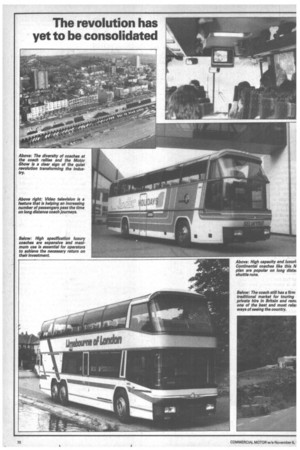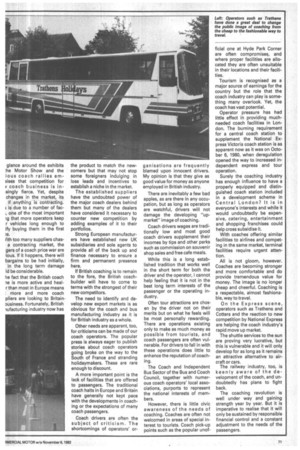The revolution has yet to be consolidated
Page 38

Page 39

If you've noticed an error in this article please click here to report it so we can fix it.
glance around the exhibits :he Motor Show and the bus coach rallies emsises that competition for coach business is insingly fierce. Yet, despite changes in the market, its if anything Ts contracting. is due to a number of fac, one of the most important ig that more operators keep r vehicles long enough to ify buying them in the first :e.
fith too many suppliers chasa contracting market, the gers of a coach price war are ious. If it happens, there will bargains to be had initially, in the long term damage Id be considerable.
he fact that the British coach ne is more active and healr than most in Europe means more and more coach pliers are looking to Britain. business. Fortunately, British lufacturing industry now has the product to match the newcomers but that may not stop some foreigners indulging in loss leads and incentives to establish a niche in the market.
The established suppliers have the undoubted power of the major coach dealers behind them but many of the dealers have considered it necessary to counter new competition by adding examples of it to their portfolios.
Strong European manufacturers have established new UK subsidiaries and sole agents to provide all of the back up and finance necessary to ensure a firm and permanent presence here.
If British coaching is to remain to the fore, the British coachbuilder will have to come to terms with the strongest of their new competitors.
The need to identify and develop new export markets is as obvious for the coach and bus manufacturing industry as it is for British industry as a whole.
Other needs are apparent, too, for criticisms can be made of our coach operators. The popular press is always eager to publish stories about coach operators going broke on the way to the South of France and stranding holidaymakers. These are rare enough to discount.
A more important point is the lack of facilities that are offered to passengers. The traditional coach halts in Europe and Britain have generally not kept pace with the developments in coaching or the expectations of many coach passengers.
Coach drivers are often the subject of criticism. The shortcomings of operators' or ganisations are frequently blamed upon innocent drivers. My opinion is that they give as good value for money as anyone employed in British industry.
There are inevitably a few bad apples, as are there in any occupation, but as long as operators are watchful, drivers will not damage the developing "upmarket" image of coaching.
Coach drivers wages are traditionally low and most good coach drivers supplement their incomes by tips and other perks such as commission on souvenir shop sales and free cafe meals.
While this is a long established tradition that works well in the short term for both the driver and the operator, I cannot help feeling that it is not in the best long term interests of the passenger or the operating industry.
Often tour attractions are chosen by the driver not on their merits but on what he feels will be most personally rewarding. There are operations existing only to make as much money as possible from tourists, and coach passengers are often vulnerable. For drivers to fall in with these operations does little to enhance the reputation of coaching.
The Coach and Independent Bus Sector of the Bus and Coach Council, together with numerous coach operators' local associations, purports to represent the national interests of members.
However, there is little civic awareness of the needs of coaching. Coaches are often not welcomed in areas of special interest to tourists. Coach pick-up points such as the popular unof ficiat one at Hyde Park Corner are often compromises, and where proper facilities are allocated they are often unsuitable in their locations and their facilities.
Tourism is recognised as a major source of earnings for the country but the role that the coach industry can play is something many overlook. Yet, the coach has vast potential.
Operator pressure has had little effect in providing muchneeded coach facilities in London. The burning requirement for a central coach station to supplement the National Express Victoria coach station is as apparent now as it was on October 6, 1980, when deregulation opened the way to increased independent express and tour operation.
Surely the coaching industry has enough influence to have a properly equipped and distinguished coach station included in a development scheme in Central London? It is in everyone's interests and while it would undoubtedly be expensive, catering, entertainment and shopping franchises could help cross subsidise it.
With coaches' offering similar facilities to airlines and competing in the same market, terminal facilities require urgent attention.
All is not gloom, however. Coaches are becoming stronger and more comfortable and do provide tremendous value for money. The image is no longer cheap and cheerful. Coaching is a respectable, almost fashionable, way to travel.
On the Express scene, operators such as Trathens and Cotters and the reaction to new competition by National Express are helping the coach industry's rapid move up market.
The shuttle services to the sun are proving very lucrative, but this is vulnerable and it will only develop for as long as it remains an attractive alternative to aircraft or cars.
The railway industry, too, is keenly aware of the development of the coach, and undoubtedly has plans to fight back.
The coaching revolution is well under way and gaining strength year by year. But it is imperative to realise that it will only be sustained by responsible financial control and a constant adjustment to the needs of the passengers.








































